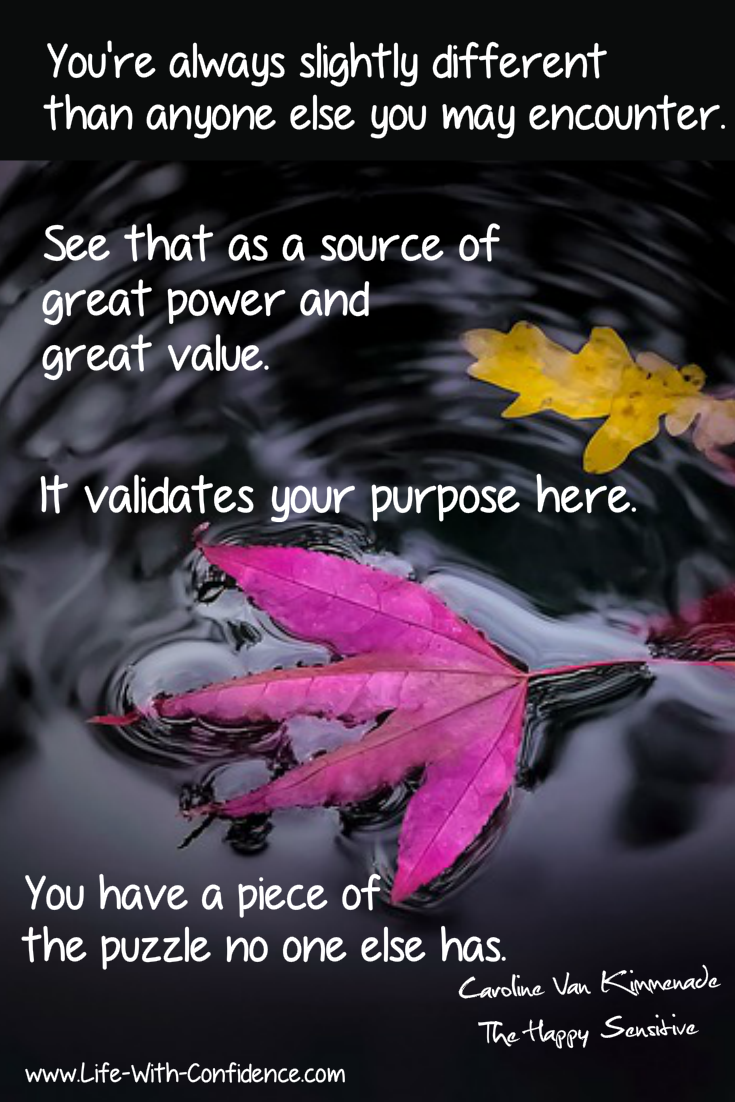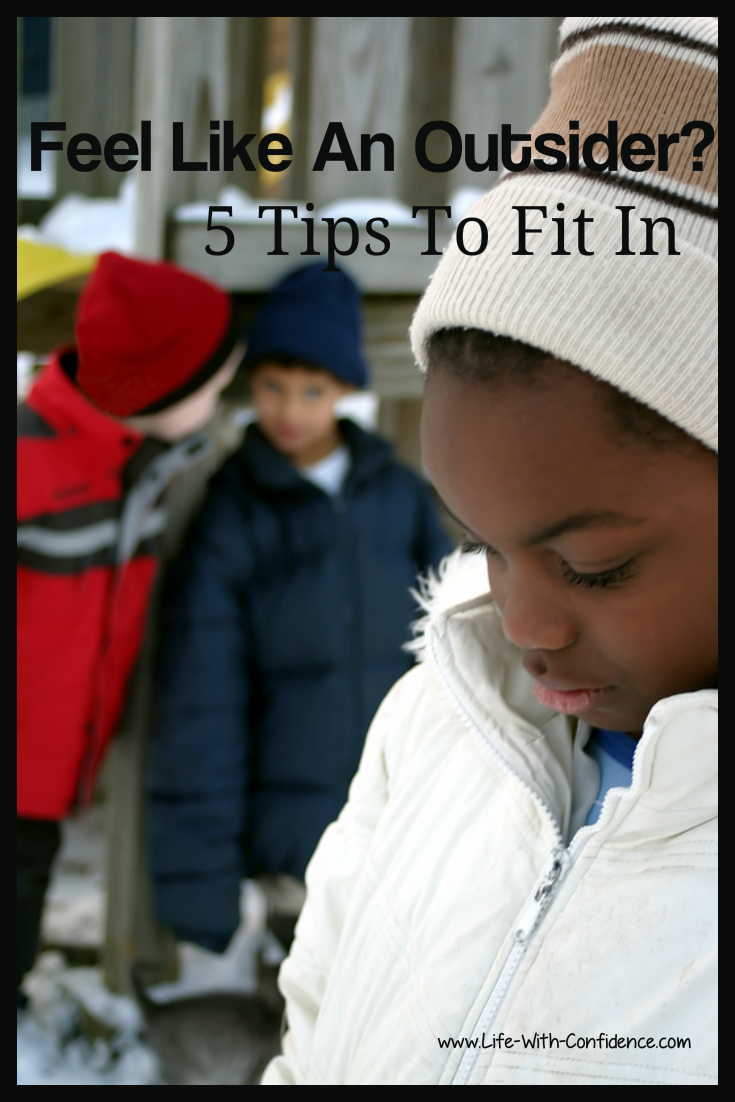Why Don't I Fit In?
by Catherine Pratt
www.Life-With-Confidence.com
This article is in response to the question I received about "Why don’t I fit in anywhere?"
You can see the original posting here.
I just don't feel like I fit in anywhere
Feeling like you don't belong anywhere is a huge issue that affects so many people and it can be very confusing and painful as to why it’s happening. It'd be nice if the solution was as simple as just learning to approach others first or being more outgoing but most often the real issue behind, "Why don't I fit in?" comes down to your own thoughts. This is good news in that you have total control over your thoughts and you can make changes. It all starts with becoming aware of the thoughts that are getting in your way.
To help figure this out, let's start with ten questions to ask yourself. These questions will help bring to light some of the more common thoughts which might be causing you to feel like you don't fit in anywhere.
1. What would “fitting in” mean to you?
"Fitting in" means different things to different people. For you, what exactly would that mean?
Would it mean that:
- you’re the centre of attention
- you do lots of activities with a variety of people
- you have lots of friends
- feel like you're important to the group
- people seek you out for your opinion and you feel people listen to you
It’s important that you’re clear in what it means to you so that you can work on achieving that. You also need to make sure that it's what you’d really like in your life. It’s easy to say, “I’d like to have lots of friends” but if you’re a person who really likes to have alone time and do things on your own, having lots of friends who take up all your free time would end up being somewhat of a nightmare for you. Maybe what would work better is having just one or two really good friends. You may find that’s all you need. If you know that then you’ll be satisfied when you find those couple of good friends and won’t keep thinking that you “should” have more friends or think you should be the centre of attention at events. You also won’t be upset if you don’t fit into every group. Some groups just aren’t conducive to “fitting in”. For example, a meditation group. People aren’t going there to laugh and joke with others. They want to be calm and look deep within themselves. Expecting to be part of a group isn't realistic in some situations. It's also okay if you don't fit into some groups. You don't have to fit in with everyone.
What would you "be" and what would you be "doing" if you did fit in?
If you visualize yourself fitting in somewhere, what do you see yourself
doing? Are you being open with others, are you laughing, making jokes,
telling everyone stories about what you did that day? Also, what would
you be "being"? Would you be happy, be at peace, be friendly? Now,
what's really stopping you from "being" this way already? You can
totally be at peace with yourself, you can be happy, you can be friendly
to other people, you can tell someone a story about what you did that
day. Sometimes by being the person you want to be, actually brings that
into your life. Be that person who fits in everywhere.
2. Do you say more than Hi to people and start conversations or do you wait for others to engage you first?
.Have you had a chance to check out my Conversation Starters article? That might help as well. Maybe you just need to engage people in a little more than just “hi”. Then, the next time you see them, you have something right away to talk to them about. For example, say you find out that one of the people in your group has a dog and you have a dog too. Great, you have something in common. So, you could talk about that. And, then the next time you see that person you could ask them about their dog or tell them about a dog course you just took or a great dog park you’ve found. But, you’re interacting more and you become more interesting to other people and develop greater bonds than if you just say “Hi” and wait for the other person to make the conversation all the time. If you just say, “Hi” and wait for the other person to do all the talking then people may avoid talking to you. Just saying hi and then giving the impression that you’re expecting them to be in control of the conversation will make them feel very awkward and it puts a lot of pressure on them to think of something to say to you. The solution to this is simply to make it easy for people to talk to you. Take a look at that article I mentioned to get some more ideas.
3. What are you thinking about when you enter the room?
When you sit down in the group, pay attention to your thoughts. What are you thinking? My guess is that you’re expecting people to not say hello or to avoid eye contact or not sit next to you. Or you may be pre-judging people, "Oh, she'd never talk to me".
Also, because that’s what you’re expecting, that’s what you’re looking for. You’re looking for signs of rejection. You’re not looking for opportunities to strike up a conversation with someone, you’re looking for people to reject you. That very much comes across in the impression that you give off to people.
Because those are negative thoughts, you may also be feeling somewhat angry as well. That’s what people will see. You’ll look unapproachable and people will avoid you.
These thoughts will be appearing in your body language. Glance down at your body and see how are you standing? Where are your arms? Are they grasped tightly against you? Are your hands balled into fists? If so, these are all signs to others to not approach you. Also, what is your face doing? So many of us are gritting our teeth or avoiding eye contact with others and this also repels other people.
Relax your body. Open yourself up to experiencing whatever you can wherever you are. Smile.
The other thing that may be happening is that you're concentrating too much on yourself. For example, you may be thinking, "I shouldn't have worn this shirt. I'm so stupid for wearing this shirt." You're too caught up in your own head instead of focusing on what's happening around you. You're also putting yourself down and you'll be giving off the body language that you're angry with yourself. Don't get caught up in worrying about the impression you're making on others or trying to think of something clever or witty to say. Just be yourself. That's the person people want to get to know.
Also, are you instantly comparing yourself to others? If you're comparing yourself to others then you're not being yourself. People want to get to know you, not a person stressed out because they're putting themselves down for not being exactly like everyone else. As Caroline Van Kimmenade says, "You're always slightly different than anyone else you may encounter. See that as a source of great power and great value. It validates your purpose here. You have a piece of the puzzle no one else has." Be proud of being unique and special.
4. What are your thoughts consumed with while you’re sitting in the room?
Are you thinking about how you never fit in anywhere or maybe how no one likes you? If that’s what your focus is on, then this might be causing some of your problems. Those are painful thoughts and your body language will express this loud and clear. You’ll feel awkward and out of place so that’s how your body will react. You may be more hunched over or hide your face with your hair. Whatever you do, you’ll be expressing how you don’t think you belong there. That's what people will react to.
You’ll also be looking for people to reject you so that’s what they do. They will be mirroring what you’re thinking about yourself.
You need to change your focus and stop thinking about yourself. You need to be not so concerned about whether you fit in or not. It’s not that you don’t care, it’s that you change your focus to be on what people are saying or what you can learn from the situation or just being there and enjoying the moment. You’re not thinking about yourself and this does make a major difference. You’re not concerned with getting people to like you or gain their approval. You’re more comfortable in your own skin and are interested in what’s going on around you.
5. Do you feel that there’s a wall between you and everyone else?
I used to feel this for the longest time. But, it comes from focusing too much on yourself and not enough on those around you. You’re focused on how you don’t fit in, how you can’t connect with others so of course you can’t connect with others. You’ve set up a self fulfilling prophecy for yourself.
Just let yourself "be" in any situation, and most likely you'll end up fitting in quite nicely after a while. It's that extreme self consciousness that separates you the most. Let that go and just be.
The other issue that's caused by focusing on this wall between you and others is that you'll be less likely to share yourself with others. You probably won't tell anyone about things you've done or how you feel about things. You're shut off from others which means you won't be able to have truly meaningful relationships.
6. Are you worried about getting hurt by others?
Do you have a fear that if you let someone in, then you might end up getting hurt? If you do, then you're going to come across to others as stand-offish. They may think that you don't like them and don't even want to talk to them. Most likely the complete opposite of what you intend.
You need to be open and willing to be a friend to others before others will be receptive to being friends with you.
And, yes there is a chance that you might get hurt if you open yourself up to others. Being open to others and having feelings is a risk because when you have feelings, you can be hurt. But on the other hand if you don't have feelings, yes, you might not get hurt, but you also don't engage fully in life. You're only living a shell of a life and you say to yourself so many times, "I don't fit in anywhere."
The trick is to have feelings but also have the ability to manage those emotions so that you're not overwhelmed if tragedy ever strikes. It's also knowing and trusting in yourself that when the pain and the hurts do come along, you make it through them just fine. You'll probably also find that it doesn't really hurt you as much as you expected and not only that, you'll be enriched by the entire experience. The fear of getting hurt is usually much worse than the reality. And, usually, you don't get hurt. You make some friends and you feel much more happy and positive about life. You haven't let fear get in your way.
7. Do you like and appreciate yourself?
This is important in that it will affect how you interact with other people. If you don’t really like yourself, people will pick up on this. You’ll also be looking for approval in other people. You won’t be thinking of yourself as valuable and as being able to offer a lot to people with your friendship. If this is an issue for you, working on your self esteem might be a good place to start.
Being an approval seeker will actually affect how you behave around others. When others do talk to you, you'll be trying to think of something clever or witty to say rather than listening to that person. Or, you'll be worrying about not saying something stupid or not letting them see the pimple on your forehead. You'll be concentrating on yourself rather than the other person. You won't be completely engaged in the conversation. You'll miss a lot of the actual conversation and it won't feel very satisfying to you. And, afterwards, you'll spend a lot of time replaying the conversation and beating yourself up for saying the wrong thing or not coming across as clever as you would have liked. By being an approval seeker, you've actually caused yourself to not fit in. So, if this is an issue for you, then there's lots of articles on my site which can help steer you in the right direction to become a non approval seeker. Your relationships will dramatically improve once you let go of this bad habit.
8. Do you expect other people to put you down or make fun of you?
If you do, then you’ll be analyzing everything people say and looking for the insult. Someone will compliment you and you’ll put yourself down. It’s hard to have a conversation with someone who puts themselves down all the time or who takes everything they say the wrong way. So, pay attention to what you’re expecting and how those expectations affect your behavior.
Instead of analyzing everything that’s said as to whether it’s an
insult or not, just take it at face value. Don’t add anything to it.
For example, if someone says, “I like your earrings.” Don’t start
thinking that they’re just saying that because they feel sorry for you.
Just take it at face value and say, “Thank You”. And, even better would
be to add some more detail like,
"Thank you. I got them at Jo-Anne’s boutique. You know the one down on
Elm Street? Have you ever been there?" Then, they’ll either answer yes
or no and you can add something else like, “They have the cutest
earrings there. I always find something I want." And, the next thing you
know you’re having a conversation with someone and you’re fitting in
just fine. Just by adding that little bit more information you’ve become
interesting and made it really easy to talk to you.
Instead of expecting the worst from others, try to be interested in the person you're speaking to. What interesting thing can you find out about them?
9. Do you have healthy boundaries?
Barbara Sachs Sloan says that, "You decide on certain reasonable standards and preferences, and people who violate your trust and prove themselves detrimental to you are people you don't form relationships with." This is fantastic advice and by having this concept as a truth in your life definitely changes how you feel about yourself. You're open to people up until a certain point. If you don’t have healthy boundaries then you’re much more likely to be so desperate to have anyone like you or talk to you that you’ll let anyone in. It's when you don't have the boundaries that you end up getting hurt much more often.
When you decide on your own standards, you're automatically less concerned with how you're coming across because you're actually assessing the other person as to whether they're someone you want to have in your life. You're not just letting anyone in. There's a much healthier level of self respect there. Having the different mindset would totally come across in your body language. One would be seen as being comfortable in your own skin, the other would come across as being desperate and needy.
10. Are you angry at the world and feel like there’s nothing you can do?
There’s two aspects to this question. If you’re angry at the world then whenever someone does strike up a conversation with you, you’re going to be seeing the negative in everything. You’ll complain about everything and just express how angry you are at everything. People will avoid you. By being so angry at the world you will repel people.
The second part is that if you think there’s nothing you can do, then you’re not going to do anything to solve this issue. You’re going to think that it’s someone else's job to do something. You’ll also blame other people and will be waiting for someone else to do something. You’ll think other people should include you in a group or speak to you first. You have to take back control of your life and realize that there is lots you can do. It all starts with you.
For more on this one, check out, "Why Am I So Angry? 11 possible reasons"
Summary
By asking these questions, hopefully you'll be able to see how much of an effect your thoughts have on situations and how you feel about yourself. Your thoughts not only determine how you think about the situation (it’s good, it’s bad, it’s neutral), they’ll affect your body language as well. And sometimes, the easiest solution really is to just change your focus. Stop being so self conscious and start looking around you. What's happening around you, what's interesting, what are people talking about, what can you learn? But, it does start with listening to what you're thinking about and what you're telling yourself. And then pretty soon you're fitting in just fine.
Here's one last quote for you from J. Iron Word:
"I stopped trying to fit in when I realized my happiness wasn't found in feeling like others, but in being comfortable being myself."
Additional Resouces
Leonard Nimoy's Inspirational Letter
In 1968, Leonard
Nimoy (better known as Spock in the Star Trek series) responded to a fan
who wanted to know how he handled not fitting in. Some of the gems from
this letter are, "But it was only the need for popularity that was
ruining his happiness. The question was which was more important, was
being 'popular' with the pack who might turn on him any minute or being
true to himself?" Also, "When you think of people who are truly great and who have improved the world, you can see that they are people who realized they didn't need popularity because they knew they had something special to offer the world, no matter how small that offering seemed." And one more fantastic gem from this article, "He replaced the idea of wanting to be liked with the idea of becoming accomplished." Read the full article here or on My Star Trek Scrapbook.
I Don't Fit In Anywhere
Do you feel like you don't fit anywhere, not even with your own family? Then you need to read this book, "Complex PTSD, From Surviving to Thriving" by Pete Walker. It will explain your entire life to you. Highly recommended.
#ad Quote From The Book - "A key aspect of the abandonment depression in Complex Post Traumatic Stress Syndrome (Cptsd) is the lack of a sense of belonging to humanity, life, anyone or anything."
Complex PTSD: From Surviving to Thriving: A Guide and Map for Recovering from Childhood Trauma
Related Articles
- Feel Like An Outsider
5 tips to fit in
Back to original question, "I just don't feel like I fit in anywhere"
<-- Confidence With Relationships page




